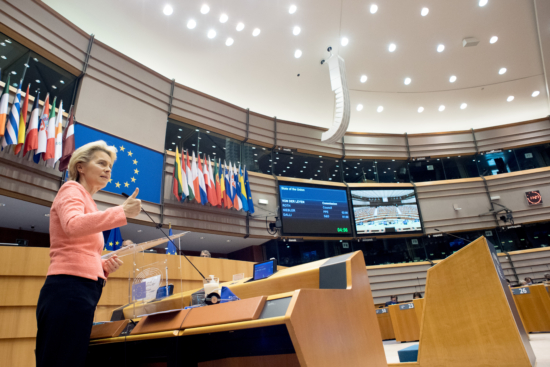European tyre industry to help achieve new EU climate goals
 Ursula von der Leyen, EC president, delivers the State of the Union address at the European Parliament on 16 September 2020 (Photo: EC - Audiovisual Service)
Ursula von der Leyen, EC president, delivers the State of the Union address at the European Parliament on 16 September 2020 (Photo: EC - Audiovisual Service)
The European Commission’s new target of a 55 per cent reduction in greenhouse gas emissions by 2030 has been welcomed by the tyre industry. The European Tyre & Rubber Manufacturers’ Association said that the industry is ready to “ready to contribute” to the latest decarbonisation goals. The association added that its “members have been committed to reducing their CO2 footprint throughout the tyre life cycle and investing in innovative and sustainable mobility technologies for many years now.” The association was responding to European Commission president Ursula von der Leyen’s 16 September State of the Union address.
Expanding upon its support for the EU’s latest announcement, the ETRMA added that Europe continues to strive for “more innovative and sustainable mobility solutions to advance common interests.” It added that the transition to a decarbonised and digitalised industry following the impact of the Covid-19 crisis on the European economy “will need to support and strengthen” the continent’s “economic recovery and global competitiveness.”
Tyre manufacturers have been decarbonising manufacturing facilities in the EU. At the same time, tyre technology has also focused increasingly on the role tyres play in supporting the green optimisation of vehicles. Tyres can improve vehicle’s fuel efficiency via reduced rolling resistance. Tyre suppliers have also developed new digital and data services, which support increased vehicle efficiency and resource consumption.
The ETRMA pledged to continue the industry’s close work with European and national institutions to move towards “a greener future…while also maximising road and passenger safety, health and comfort.” It stressed that the EU must also set the right policy priorities and “follow progressive timetables with respect to all tyre performances” to support the industry. It said this coordination between industry, the European institutions and member states “needs a holistic approach to the green transition by including clear policies on industrial competitiveness, trade, digitalisation, skills and mobility.”
“To ensure that this level of ambition becomes a reality, it needs to be sustained by equally ambitious financial support so that the green transition is achieved without leaving anyone behind. We therefore welcome the commitment of directing 37 per cent of NextGenerationEU to support green projects and 20 per cent to boost digital transformation,” concludes Fazilet Cinaralp, secretary general of ETRMA.


 The Tyre Collective
The Tyre Collective

Comments